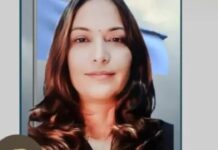A trove of files showed how hundreds of millions of dollars of public money went offshore
ALSO IN THIS PACKAGE
- Document trove shows how ‘Africa’s richest woman’ stole fortune: ICIJ
Lisbon: It was the party to be seen at during the Cannes Film Festival, where being seen was the whole point. A Swiss jewelry company had rented out the opulent Hotel du Cap-Eden-Roc, drawing celebrities like Leonardo DiCaprio, Naomi Campbell and Antonio Banderas. The theme: “Love on the Rocks.”
Posing for photos at the May 2017 event was Isabel dos Santos, Africa’s richest woman and the daughter of JosE Eduardo dos Santos, then Angola’s president. Her husband controls jeweler De Grisogono through a dizzying array of shell companies in Luxembourg, Malta and the Netherlands.
But the lavish party was possible only because of the Angolan government. The country is rich in oil and diamonds but hobbled by corruption, with grinding poverty, widespread illiteracy and a high infant mortality rate. A state agency had sunk more than $120 million into the jewelry company. Today, it faces a total loss.
Dos Santos, estimated to be worth over $2 billion, claims she is a self-made woman who never benefited from state funds. But a different picture has emerged under media scrutiny in recent years: She took a cut of Angola’s wealth, often through decrees signed by her father. She acquired stakes in the country’s diamond exports, its dominant mobile phone company, two of its banks and its biggest cement maker, and partnered with the state oil giant to buy into Portugal’s largest petroleum company.
Now, a trove of more than 700,000 documents obtained by the International Consortium of Investigative Journalists, and shared with The New York Times, shows how a global network of consultants, lawyers, bankers and accountants helped her amass that fortune and park it abroad. Some of the world’s leading professional service firms – including the Boston Consulting Group, McKinsey & Co. and PwC – facilitated her efforts to profit from her country’s wealth while lending their legitimacy.
The empire she and her husband built stretches from Hong Kong to the U.S., comprising over 400 companies and subsidiaries. Among the businesses was the Swiss jewelry company, which records and interviews reveal was led by a team recruited from Boston Consulting. They ran it into the ground. Under their watch, millions of dollars in Angolan state funds helped finance the annual parties on the French Riviera.
When Boston Consulting and McKinsey signed on to help restructure Sonangol, Angola’s state oil business, they agreed to be paid in an unusual way – not by the government but through a Maltese company dos Santos owned. Then her father put her in charge of Sonangol, and the government payments soared, routed through another offshore company, this one owned by a friend of hers.
PricewaterhouseCoopers, now called PwC, acted as her accountant, consultant and tax adviser, working with at least 20 companies controlled by her or her husband. Yet there were obvious red flags as Angolan state money went unaccounted for, according to money-laundering experts and forensic accountants who reviewed the newly obtained documents.
Now, more than two years after her father stepped down after 38 years as Angola’s strongman president, dos Santos is in trouble.
Last month, an Angolan court froze her assets in the country as part of a corruption investigation, along with her husband’s and those of a Portuguese business associate. The Angolan attorney general claimed the couple were responsible for more than $1 billion in lost state funds, with particular focus on De Grisogono and Sonangol.
Dos Santos and her husband could face years in prison if convicted, according to the office of Angola’s president, João Lourenco. At the heart of the inquiry: $38 million in payments from Sonangol to a Dubai shell company hours after Angola’s new president announced her firing. Dos Santos’ half brother is also facing corruption charges for helping to transfer $500 million from Angola’s sovereign wealth fund. The asset freeze came soon after ICIJ reporting partners asked the government about transactions in the documents.
In an interview with the BBC, dos Santos, 46, denied any wrongdoing and called the inquiry a “political persecution.” “My companies are funded privately, we work with commercial banks, our holdings are private holdings,” she said.
Her husband, Sindika Dokolo, 47, suggested the new government was scapegoating them. “It does not attack the agents of public companies accused of embezzlement, just a family operating in the private sector,” he told Radio France Internationale, another ICIJ partner.
Global banks including Citigroup and Deutsche Bank, bound by strict rules about politically connected clients, largely declined to work with the family in recent years, the documents show.
Consulting companies, far less regulated than banks, readily embraced her business.
‘Shadow Management’
De Grisogono, an upstart Swiss jewelry company, was on life support. Its business had never fully recovered from the global financial crisis, and by 2012, it was deeply in debt.
Dokolo, dos Santos’ husband, seemed to offer a way out. He teamed up with Sodiam, the Angolan state diamond marketer, in a 50-50 venture set up in Malta that took over the jeweler. The state enterprise eventually pumped more than $120 million into the business, acquiring equity and buying off debt, the records indicate.
Flush with Angolan government money, the Geneva jeweler hired the Boston Consulting Group, an American management company with offices in more than 50 countries.
In 2012, according to the documents, a Lisbon-based team at the firm took a central role in helping to run De Grisogono – “shadow management” as John Leitão, a Boston Consulting employee who would become the jeweler’s chief executive, said in a November interview in Lisbon.
De Grisogono had a run of bad luck, including economic pressures affecting Russian oligarchs and Saudi sheikhs who had been big customers, Leitão said. Yet many rich patrons, including dos Santos and her husband, would take jewelry and wristwatches without paying for them up front, the documents show. Marketing expenses also shot up – 42% during Leitão’s first year to $1.7 million, with the increase going to the Cannes party, according to an internal presentation.
The Angolan people did more than pay dearly for a European jewelry company. They paid with money borrowed at a 9% annual interest rate from Banco BIC, an Angolan lender where dos Santos owns a 42.5% stake. The government will have to repay some $225 million, according to the Angolan president’s office. The loans had been guaranteed by dos Santos’ father.
Striking Oil
In 2016, Sonangol, Angola’s state oil company, was in crisis after a drop in market prices. One former Boston Consulting employee described a company in an “absolutely chaotic” state. The Angolan president fired the company’s board and appointed his daughter, Isabel dos Santos, as chairwoman that June. Boston Consulting was helping Sonangol come up with a “road map” to restructure.
Dos Santos had a history with the company. A decade earlier, she and her husband made millions partnering with Sonangol and a Portuguese businessman to invest in a Lisbon gas company, Galp Energia. Their stake came courtesy of the Angolan government – through an $84 million loan from Sonangol, documents show. Their share in Galp is now worth about $800 million.
More than half a year before she was named chairwoman, her father signed off on a decree drafted at the couple’s law firm, records show, that led to the awarding of $9.3 million to a Maltese company to oversee Sonangol’s restructuring. The business, Wise Intelligence Solutions, was owned by the couple and run by a close associate, Mario Leite da Silva, De Grisogono’s former chairman. Boston Consulting came on board, followed by McKinsey, with the Maltese firm acting as their manager.
In May 2017, Wise was replaced as project manager by a company in Dubai owned by one of her friends. It issued a flurry of invoices later that year, some with the barest of details. One of them, simply marked “Expenses May-September 2017,” carried a charge of more than 470,000 euros (over $520,000). These invoices account for the $38 million Sonangol paid to the Dubai company in the hours after dos Santos was fired on Nov. 15, 2017.
The Sonangol account was with the Portuguese arm of Banco BIC, where she was the biggest shareholder. Shunned by global banks, the couple increasingly relied on the Angolan lender, which has a big office in Lisbon steps from her apartment.
Days before the invoices were issued, the Sonangol executive who would have approved them was fired, replaced by a relative of dos Santos, the documents show.
Months later, Carlos Saturnino, dos Santos’ successor as Sonangol’s head, publicly accused her of mismanagement, saying her tenure was marked by conflicts of interest, tax avoidance and excessive reliance on consultants. He also said she had approved $135 million in consulting fees, with most of that going to the Dubai shell company.
The Accountant
Dos Santos had a long history with PwC. In the early 1990s, fresh out of King’s College London, she took a job with Coopers & Lybrand, soon to merge to become PricewaterhouseCoopers.
Her top money manager, da Silva, whose assets in Angola were frozen last month, was also a PwC alum. And when dos Santos took over Sonangol, she brought in a PwC partner, Sarju Raikundalia, as its finance head. The payments to Dubai in November 2017 happened on his watch before he, too, was fired. Neither of the businessmen responded to requests for comment.
PwC not only audited the books of her far-flung shell companies, but also provided her and Dokolo’s companies with tax advice and did consulting work for Sonangol.
Like Boston Consulting, PwC was paid by Wise Intelligence for its Angola work, and it audited the financial statements of the Maltese holding companies that controlled the Swiss jeweler.
As for dos Santos’ assets, the bulk of her fortune is now outside Angola, much of it in tax and secrecy havens where it will be hard to pry loose.




